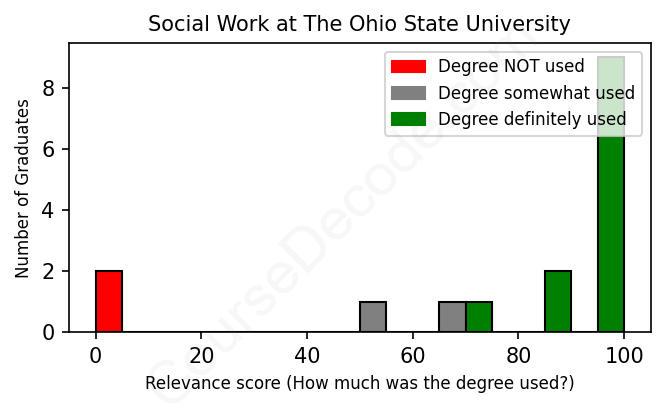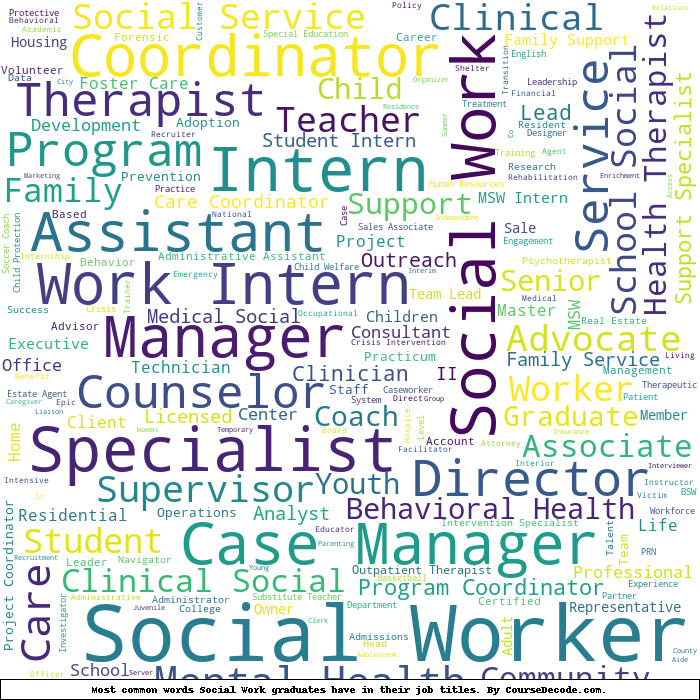
First, some facts. Of the Social Work graduates from The Ohio State University we've analyzed , here's how many have used (or NOT used) their degree in their career:

These are estimates based on AI analysis of 16 LinkedIn profiles (see below).
The verdict? Significantly above average. Overall, with an average relevance score of 78%, Social Work graduates from The Ohio State University have a much higher likelihood (+11%) of finding work in this field compared to the average graduate across all fields:
And for comparison, here's the chart for all profiles we've looked at across all degrees.
Also, after graduating, 68% of these graduates have pursued further education other than another Bachelor's degree (such as a Masters degree or other), compared to the average across all profiles of 35%. This suggests you may need more than just a Bachelors degree to be competitive as a Social Work graduate.
See the details:
|
Relevance score: 97% We think this person has gone into a career highly relevant to their degree. We think this person has gone into a career highly relevant to their degree.
DEGREE INFOGraduated in 2018 from The Ohio State University with a Bachelor of Science (BS) in Social Work. No other secondary education since. JOB HISTORY SINCE GRADUATIONFacilities Manager Star House Jan 2018 - May 2018 Child Welfare Caseworker 1  Franklin County Children Services May 2018 - Jun 2021 Advocate  Disability Rights Ohio Jun 2021 - Present ABOUTNo information provided. |
The top 10 most common jobs done by the graduates we've analyzed (ranked most common to least) are:
When analyzing the job positions held by graduates from The Ohio State University with a degree in Social Work, it's clear that many of them have pursued careers heavily linked to their field of study. Common roles include case managers, therapists, and coordinators in areas like child welfare, mental health, and anti-human trafficking. These positions are directly relevant to social work, employing the principles and practices taught during the program. For instance, roles such as Adoption Assessor, Crisis Clinician, and Victim Advocate demand a solid grasp of social work theories, highlighting a strong trend among graduates to apply their education in meaningful ways within the community.
However, not all job placements reflect this direct correlation with social work. A few graduates have ended up in roles that seem to stray from the core objectives of the degree, such as administrative positions, teaching, or functioning more in a business capacity without the direct application of social work skills. It’s interesting to see that while many graduates have utilized their degree effectively, there are also instances where the connection to social work is more tenuous, raising questions about the diverse paths that a social work education can influence. Overall, it’s encouraging to see a majority of graduates engaged in work that aligns closely with their training, making a tangible impact in various social issues and communities.
Here is a visual representation of the most common words in job titles for Social Work graduates (this is across all Social Work graduates we've analyzed, not just those who went to The Ohio State University):

The graduates from The Ohio State University who studied Social Work have generally followed career paths that align well with their degree. Most often, their first jobs post-graduation include roles like case managers or social work interns, indicating that they're diving right into the field. For instance, several early-career graduates held positions as caseworkers in child welfare or worked with organizations focusing on youth and families. This is a solid start as it reflects their training and directly addresses the issues they studied in school.
As they advance in their careers, which is typically within five to ten years, many graduates either deepen their expertise within social work—taking on roles like therapists, clinical directors, and specialists in anti-trafficking—or branch into related fields like public health and advocacy. Some have moved into significant positions, such as directors at social service agencies or consultants in public health. While a few may have pivoted to roles that aren't strictly social work, such as administrative or compliance jobs, the overall trajectory appears to be strong, with a majority remaining connected to the core principles of social work. This suggests that their education and initial experiences effectively set them up for meaningful careers in helping others.
Honestly, a Bachelor's degree in Social Work can be pretty challenging, but it's not the hardest major out there. At The Ohio State University, like most schools, you'll dive deep into topics like human behavior, ethics, social policies, and community dynamics, which means a lot of reading and writing. There's also a practical side with fieldwork, which can be both rewarding and tough because you’re working directly with people and real-life situations. While it definitely requires dedication and passion, if you’re genuinely interested in helping others and engaging with social issues, you might find it a really fulfilling experience, even if it gets a little intense sometimes. So, it’s definitely on the demanding side, but if it’s your thing, it can also be super enjoyable!
Most commonly, in the LinkedIn profiles we've looked at, it takes people 4 years to finish a Bachelor degree in Social Work.
Looking at these Social Work grads from Ohio State, it seems like their paychecks might not exactly be breaking the bank, but they're doing alright considering the field they chose. Social work jobs, especially in case management and advocacy, often start low but can increase with experience and specialization—especially for those moving into roles like therapists or directors like the one who became Director of Social Services. The ones working in schools or non-profits might not be raking in big bucks, but they’re definitely gaining valuable experience and helping their communities. So, while they might not be ballers, most are finding decent, stable jobs that play to their passion for helping others, and that could lead to better financial opportunities down the road.
Here is a visual representation of the most common words seen in the "about" section of LinkedIn profiles who have a Bachelor degree in Social Work (this is across all Social Work graduates we've analyzed, not just those who went to The Ohio State University). This may or may not be useful:

Here are all colleges offering a Bachelor degree in Social Work (ordered by the average relevance score of their Social Work graduates, best to worst) where we have analyzed at least 10 of their graduates: